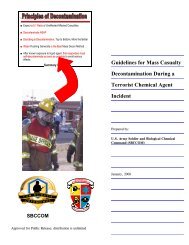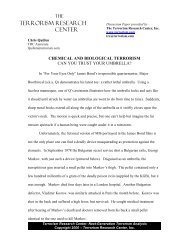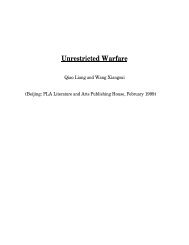Combating Proliferation of Weapons of Mass Destruction
Combating Proliferation of Weapons of Mass Destruction
Combating Proliferation of Weapons of Mass Destruction
Create successful ePaper yourself
Turn your PDF publications into a flip-book with our unique Google optimized e-Paper software.
Department <strong>of</strong> StateThe Department <strong>of</strong> State (State) has preeminent responsibility and authority for theconduct <strong>of</strong> U.S. foreign policy. Thus, State should be assigned the principal responsibilityfor communicating to foreign governments U.S. policy on proliferation <strong>of</strong> weapons <strong>of</strong> massdestruction, and should play a central role in defining and coordinating U.S. policy.A Reorganized Department <strong>of</strong> State: Long-term Challenges andOpportunitiesThe integration <strong>of</strong> the Arms Control Disarmament Agency (ACDA) into the StateDepartment in April 1999 resulted in the consolidation under the Department’s purview <strong>of</strong>a number <strong>of</strong> new international security affairs and arms control functions. Prior to 1999,ACDA was responsible for formulating, advocating, and negotiating arms control and nonproliferationagreements. During this time, ACDA worked to establish and institutionalizean arms control verification process that was used (1) to focus Intelligence Communitycollection, analysis, and dissemination and (2) to provide procedures by which noncompliantbehavior could be brought to the attention <strong>of</strong> other agencies and deliberated inthe interagency process. Important proliferation-related agreements, such as the Non-<strong>Proliferation</strong> Treaty, the Chemical <strong>Weapons</strong> Convention, the Biological <strong>Weapons</strong> and ToxinConvention, and the proposed Comprehensive Test Ban Treaty, have all been the focus <strong>of</strong>ACDA negotiation and advocacy. Implementation was left to other agencies.When ACDA existed as a separate agency, activity within the Department <strong>of</strong> State onproliferation-related policy was divided between regional (e.g., European and CanadianAffairs) and functional (e.g., Political-Military Affairs) bureaus. Moreover, coordinationauthority was divided between the Under Secretaries responsible for bilateral affairs(Under Secretary for Political Affairs) and arms control (Under Secretary for Arms Controland International Security Affairs). These circumstances <strong>of</strong>ten led to a wide range <strong>of</strong>bilateral policy considerations dominating functional policy concerns, includingproliferation-related policy objectives. Thus, despite the primacy <strong>of</strong> proliferation-relatedgoals in U.S. declaratory policy, the imperatives <strong>of</strong> day-to-day bilateral policy concernsundercut our proliferation goals vis-a-vis certain governments.Arms control and non-proliferation are now under the day-to-day jurisdiction <strong>of</strong> a neworganization headed by the Under Secretary for Arms Control and International SecurityAffairs. The Department has reorganized its political-military affairs bureaus accordingly,replacing the Bureau <strong>of</strong> Political-Military Affairs with three new bureaus designed toaccommodate new missions, as well as the substantial increase in personnel, resultingfrom the absorption <strong>of</strong> ACDA.47







